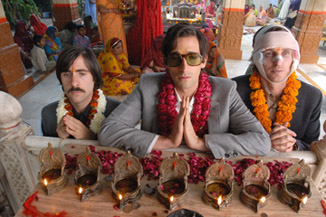|
|
Movie Review: The Darjeeling LimitedBy Shane JenkinsOctober 10, 2007
I think it's just that India is too sprawling and complex to fit into Anderson's hyper-focused vision. Something happens in the middle of the film, something significant that makes the entire beginning, with the bickering, scheming and lying, seem like the waste of time that it is. And here is where I figured Anderson would drop the affectations and domino-precision of his film-making style and really let the story take over. He doesn't, of course. It's the same elaborate tracking shots and choreographed acting, more out of place than ever in this poor Indian village. And it's really a missed opportunity. The story ultimately, as with all his films, is about learning to face responsibilities and finally grow up, and he had the perfect platform to indicate this visually. After an hour's worth of running time in which the brothers are immune to everything around them but their own broken lives, Anderson could have used this event to open up the world and take a look around. By filming it in the same style as the rest, it makes the emotional impact seem as artificial as everything else. I've always loved the artificiality of his style before, but I always figured it was tied into the movies themselves. The Tenenbaums, for instance, are trapped in childhood, with their house being a physical manifestation of their inability to move on with their lives, so of course it is packed with an insane amount of detail. Even Anderson's OCD filming style seems to be a symptom of their dysfunction, and the songs, from Rolling Stones to Charlie Brown, act as their comfort food. Darjeeling's soundtrack, on the other hand, uses many themes from Merchant/Ivory's Indian movies, which is clever if a bit precious, but it's like he's trying to buy some India cred which he clearly hasn't earned. And the camerawork this time hurts the performances, rather than bolstering them. All three of the main actors are often appealing and engaging in other projects, but here Anderson doesn't give us any reason to like them or want to spend time with them. I simply didn't care enough about any of them to wade through their seemingly endless self-journeys. Darjeeling is the shortest of the Anderson films, but feels interminable. There is a set of luggage that the brothers spend the entire movie carting around. The baggage is given a staggering amount of screen time, and is the subject of many plot points and visual jokes. The suitcases were apparently designed by Marc Jacobs, and are, naturally, painstakingly detailed, with multi-colored animals and monograms. Two things about the luggage: 1) The payoff with the baggage is so incredibly literal and simple-minded that I wonder if Crash writer/director Paul Haggis did a script polish. 2) There couldn't be a better metaphor for Anderson himself than this bulky set of bags being carried around for far too long. His characters may have ditched theirs, but he still has a huge, immaculately designed steamer trunk on his back, weighing him down.
|

|
|
|

|
Thursday, October 31, 2024
© 2024 Box Office Prophets, a division of One Of Us, Inc.


